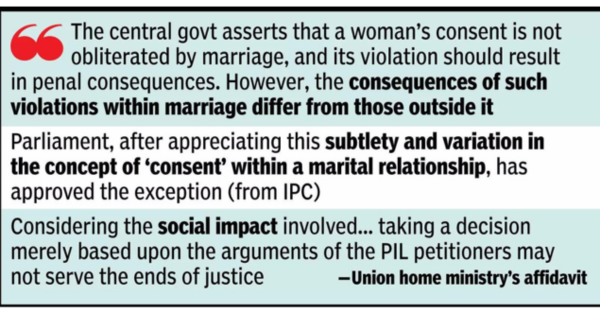NEW DELHI: Opposing criminalisation of marital rape, the Centre on Thursday told Supreme Court that a husband and wife share a unique multifaceted relationship which is not exclusively centred on sex and stressed if Parliament has thoughtfully carved out an exception for marital rape in the penal provisions (in Sec 375 of IPC), it should not be struck down by the court.
Responding to a clutch of PILs seeking criminalisation of marital rape, the Union home ministry in an affidavit said, “Given the nature of the marital institution in our socio-legal milieu, if the legislature is of the view that, for preservation of the marital institution, the impugned exception should be retained, it is submitted that it would not be appropriate for the SC to strike down the exception.”
A husband certainly does not have any fundamental right to violate the consent of the wife, the Centre said, but to equate marital intercourse with rape, would be excessively harsh and disproportionate.

Govt: Committed to ‘fully’ protecting women dignity
The Centre clarified it is committed to “fully and meaningfully” protect liberty, dignity and rights of every woman. “Govt attaches highest importance to ending all kinds of violence and offences causing physical, sexual, verbal, emotional and economic abuse including domestic violence against women The central govt asserts that a woman’s consent is not obliterated by marriage, and its violation should result in penal consequences. However, the consequences of such violations within marriage differ from those outside it,” it said.
“Parliament has provided different remedies, including criminal law provisions, to protect consent within marriage. Sections 354, 354A, 354B, 498A IPC, and Protection of Women from Domestic Violence Act, 2005, ensure serious penal consequences for such violations,” it added.
Govt said, “Consent of the woman is not evaporated rather breach of consent results in different penal consequences. It cannot be a fundamental right under Article 21 that breach of consent in all eventualities would necessarily entail the consequences of Section 375/376 of IPC. If breach of consent results in altered penal consequences thereby creating a sufficient deterrence, the said provision and exception to Section 375 cannot be faulted.”
The Centre said marriage is an institution with social aspects and implications. “Between a husband and wife, who spend their days and nights together, living in a house which, by the dint of their joint effort, they make a home, there exists a bond which defies, and indeed transcends, all known and identifiable parameters. In our country, it is submitted, marital vows are still regarded as inviolable,” it said.
“Considering the social impact involved, the intimate familial relations being the subject matter and ground realities prevailing in different parts of society of this large, populous and diverse country, taking a decision merely based upon the arguments of PIL petitioners, may not serve the ends of justice,” govt added.
It contended that since marriage is an institution which creates reciprocal conjugal rights, it therefore renders it incomparable to the concept of “consent” in any other situation outside the marriage. “Parliament, after appreciating this subtlety and variation in the concept of ‘consent’ within a marital relationship, has approved the exception while providing for other suitable remedies recognising the constitutional right of the parties to the marriage,” it said.
It said since marital rape issue relates to marriage, which is in the Concurrent list, views of states and UTs were sought. It said of the 19 states and UTs which responded to its query, only Delhi, Karnataka, Tripura were opposed to the exception to marital rape under Section 375 of IPC. Those which supported the exception included UP, MP, Gujarat, Assam, Chandigarh, Chhattisgarh, Goa and Manipur.
